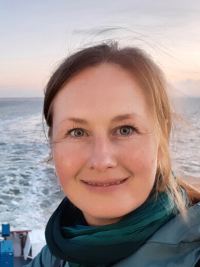NWO-subsidie voor MetaFlow-project van Anastasiia Krushynska

Dr. Anastasiia Krushynska heeft een NWO-subsidie ontvangen voor haar onderzoeksproject MetaFlow: Metamaterials and bio-inspired sensors to stabilize and monitor fluid flow and flow-induced vibrations. Anastasiia Krushynska is universitair docent Dynamica en Trillingen bij de groep Computational Mechanics and Materials Engineering (CMME) van ENTEG. Haar mede-aanvrager is prof. Ajay Kottapalli van ENTEG.
NWO kent ruim 9,4 miljoen euro toe aan negen vernieuwende PPS-onderzoeksprojecten rond opkomende sleuteltechnologieën. Het explorerende onderzoek is toegekend binnen de call ‘Opkomende sleuteltechnologieën (KIC)’. Deze call biedt ruimte aan pionierend PPS-onderzoek rond opkomende sleuteltechnologieën, gericht op exploratie en ontwikkeling van vernieuwende ideeën. Deze pionierende projecten stellen de betrokken publieke en private partners in staat een volgende ontwikkelstap te maken. Consortiumpartners leggen nog ruim 1,3 miljoen euro aan cofinanciering in.
MetaFlow
Snelle vloeistofstromen in industriële pijpleidingen zijn turbulent, wat ongewenste trillingen en lawaai veroorzaakt en de veiligheid van een systeem in gevaar brengt. MetaFlow stelt een unieke aanpak voor om stromingen te monitoren en te stabiliseren door een combinatie van bio-geïnspireerde MEMS-sensoren en elastische metamaterialen die stromingen actief kunnen monitoren en lokaal controleren in real-time door middel van fijn-afgestemde interacties. Wij zullen de opstelling ontwikkelen die deze technologie demonstreert en praktisch relevante stromingsscenario's bestuderen. Dit zal baanbrekende resultaten opleveren voor het begrijpen en stabiliseren van turbulente stromingen die nieuwe normen zullen worden voor stromingscontrole in de industrie en de wetenschap.
Impactvolle technologie
Het doel van de call ‘Opkomende sleuteltechnologieën’ is een vruchtbaar zaaibed creëren voor vernieuwende, disruptieve ideeën. De technologie is nog zo nieuw dat het disruptieve karakter nog niet bewezen is. Dit type sleuteltechnologie bevindt zich in een stadium van een breed potentieel toepassingsgebied, waarin verschillende sectoren interesse tonen om deel te nemen. Een opkomende sleuteltechnologie heeft de kans uit te groeien tot een zeer impactvolle technologie die op de langere termijn kan bijdragen aan industriële en/of maatschappelijke impact.
Wat is een sleuteltechnologie?
Een sleuteltechnologie wordt gekenmerkt door een breed toepassingsgebied of bereik in innovaties en/of sectoren. Sleuteltechnologieën zijn essentieel bij het oplossen van maatschappelijke uitdagingen en/of leveren een grote potentiële bijdrage aan de economie. Ze maken baanbrekende proces-, product- en/of diensteninnovaties mogelijk. Sleuteltechnologieën zijn relevant voor de wetenschap, maatschappij en de industrie. Bekijk het overzicht van de sleuteltechnologieën.
Samenwerkingsprojecten
Andere projecten waar de RUG of het UMCG bij zijn betrokken hebben ook een subsidie ontvangen. Het gaat om toekenningen aan prof. dr. S.M. Garcia Blanco van de Universiteit Twente waar het UMCG mede-aanvrager is, en aan prof. dr. H. Corporaal van de TU Eindhoven waar de RUG samenwerkingspartner is.
Meer nieuws
-
17 februari 2026
De lange zoektocht naar nieuwe fysica
-
10 februari 2026
Waarom slechts een klein aantal planeten geschikt is voor leven
